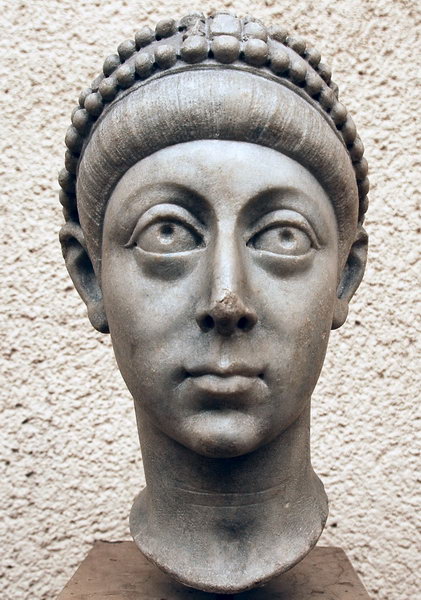Synesius, On Imperial Rule 6
 In his speech On Imperial Rule (or On Monarchy), Synesius of Cyrene offers some advise to the emperor Arcadius (r.395-408). More information about this speech, together with a brief summary, can be found here.
In his speech On Imperial Rule (or On Monarchy), Synesius of Cyrene offers some advise to the emperor Arcadius (r.395-408). More information about this speech, together with a brief summary, can be found here.
Throughout this speech, the word "Scythians" refers to the Tervingian Germans (who would later be known as Visigoths), whereas "king" refers to emperor.
The text is offered here in the translation by A. Fitzgerald. The four-digit numbers are page numbers of the Migne edition.
On Imperial Rule 6
[1] [1069] Now first let piety be its foundation, a secure pedestal this, and the statue shall stand thereon unshaken; and never shall a storm overturn it, if it remain clamped to its foundation: nay, it shall rise up with it and appear in many places, and not least upon the summit. Starting from thence, I say that with God's guidance the king ought first to be king of himself, and to establish a monarchy in his soul.note
[2] For of this be well assured, that man is not some simple object nor is he cast in one pattern, but God has made to dwell in the constitution of a single creature a host of forces mingled together and with full-toned voices. We are, I think, a monstrous animal more extraordinary than the hydra and still more many-headed.note For not with the same part of our nature, of course, do we think and desire, or feel pain and suffer anger, nor is our fear from the same source as our pleasure. Again you will observe how there is a male element in these organs, and a female, and that there is courage and also cowardice. There are in sooth all kinds of opposites within us and a certain medial force of nature runs through them which we call mind. It is this that I desire to reign in the king's soul, destroying the mob rule and democracy of the passions.
[3] So from this hearth would this man be a king using the natural beginning of authority, he who by taming and domesticating the unreasoning parts of the soul, has made them subservient to reason, marshalling their multitude under one intelligent leadership. Such a man as this is godly, whether he be a commoner or a king; but especially is the king divine because he it is who shares his virtue with whole nations, and because many men rejoice in the good deeds of such an one.
[4] It is moreover, in his case a necessity that his inner life should be passed undisturbed and that a divine calm should extend even to his countenance. And this is a sight to inspire not fear but the deepest piety, to wit, his remaining in an unruffled state of dignity, overwhelming his friends, that is to say good men, with admiration, his enemies and wicked men with terror. Nor does change of will invade his spirit, for whatever he does, this he effects by accomplishing those things which have been resolved upon by all the parts of his soul. Thus all things are ordered subject to one rule, and do not think it unworthy for each one of them both to exist as parts and to converge in the One, the whole.
[5] Now whoso separates the conjunctions of these parts, admitting the existence of their numerous energies, and wishes to placate the creature one part at a time, this man you see now lifted up in his mind, now fallen low, now disturbed by a forward impulse, and now by retreat; again by griefs, by pleasures, by absurd desires, and that man is never in agreement with himself.
Well I know what evil things I am to do
For passion is stronger than my counsels.note
[6] [1072] So said someone who understood the divergence and disagreement of equal forces. What imports most for you therefore, and a very kingly thing this it is too, is the rule over yourself, setting mind to dominate the beast that dwells with us,note and seeking not to rule over many myriads of men while you yourself a slave of the most shameful mistresses, of pleasure, of pain, and as many beasts related to these as dwell within the human creature.